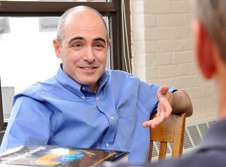3Qs: Immorality driven by corrupting influences

Notorious Boston gangster James "Whitey" Bulger — who eluded authorities for more than 16 years — is accused of murdering 19 people. Here, David DeSteno, associate professor of psychology at Northeastern University, who studies the role of emotion in social cognition and social behavior, assesses the mind of crime figures like Bulger and those who exalt them as heroes.
What drives immoral behavior?
We cannot assume that Whitey Bulger, Anthony Weiner, or other "fallen" individuals were flawed from the start. After all, Whitey’s brother, William Bulger, was raised in the same environment but followed a different trajectory; he ended up becoming the president of the University of Massachusetts. The answer, then, to what makes someone "bad?" is found in understanding how character really works. Character, as it turns out, isn't established early in life and fixed thereafter. It's always in flux. Our moral behaviors are determined moment to moment by situational influences on the competing mechanisms in our mind. One class of mechanisms focuses on what's good in the short term. The other class is focused on the long term — what actions, even if they sacrifice short-term benefits, will lead to long-term gain. Cheating or lying, for example, may offer a short-term gain. Cheating or lying too much, however, could lead to getting caught and ostracized, which carries long-term losses.
The more power that an individual possesses, the greater the disconnect between short-term and long-term impulses. With increased power, politicians, corporate CEOs, or mob bosses, for example, tend to view themselves as invulnerable and begin to favor short-term, expedient actions like cheating or aggression. Such power, then, allows the scale of character to tip toward self-serving, and possibly criminal, actions. The potential for vice and virtue resides in each of us. If we forget that, we're much more likely to act immorally as well.
Some South Boston residents appear to be rooting for Bulger. Why do so many still look at him as a local hero and turn a blind eye to his criminal record?
How we judge a person’s character often has to do with how he "related" to us. Work in my lab shows that whether we're willing to condemn someone for committing a transgression doesn't depend solely on the objective facts. For one study, we asked participants to put on one of two different colored wristbands and then watch a staged interaction between two actors, which participants thought was real. In the scenario, one actor cheated on a task that left the other with more work to complete. We then asked our research participants to judge how fairly the cheater acted. What we found was quite astonishing: If the actor who cheated was wearing the same color wristband as a participant, then the participant viewed his actions as much less objectionable than did participants wearing a different color wristband. Feeling some level of similarity with the perpetrator leads one to excuse his behavior.
This simple example shows how deeply social bonds can alter moral judgments. The people in Southie who still look at Whitey as a hero would probably condemn another individual from New York who committed the same crimes.
For 16 years, Bulger lived life on the lam with his partner Catherine Greig, whom he must have trusted not to turn him in to the authorities. What role may trust have played in their relationship?
Trust is a fundamental part of the human condition. We have to trust people because we need others to survive. Trusting another person presents an interesting dynamic because it offers the potential for joint gain, or asymmetric loss. If both individuals are trustworthy, both can benefit. If, on the other hand, one "sells out," then he or she can gain at the other's expense. How much we're willing to trust another person depends on several factors, but a primary one is the extent to which outcomes are joined.
In the case of Whitey Bulger and Catherine Greig, both faced prison sentences if the other broke ranks. Each knew enough of the other's secrets, habits and finances that if one didn't support the other, he or she would have a lot to loose. Having said that, work in our lab shows that trustworthiness is changeable. We can be very trustworthy with one person in one situation, but completely untrustworthy with another. Just because Whitey Bulger and Catherine Greig appear to have acted in a trustworthy manner with each other, does not indicate how they might deal with someone else.
Provided by Northeastern University

















